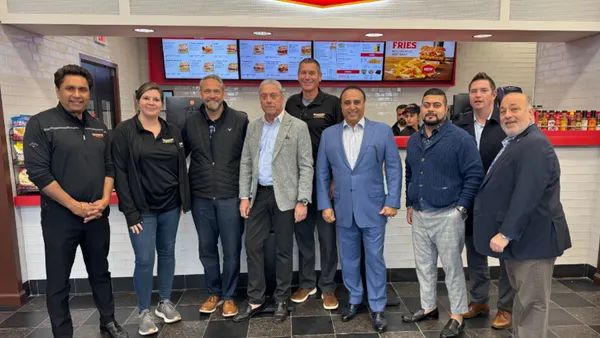UPDATE, Jan. 3, 2020: Burgerim could file for bankruptcy by the end of the month, and is facing dozens of claims of unpaid wages in California, according to Restaurant Business. Maryland, where Burgerim has sold seven franchises, suspended the burger chain's franchise registration after saying the company's franchise disclosure document is incomplete and does not disclose that the company has hired insolvency counsel and a chief restructuring officer, according to a press release.
Dive Brief:
- California-based Burgerim, which first opened in the U.S. in 2016, is considering bankruptcy. Restaurant Business reports the company plans to "restructure and reorganize to be able to move forward on a solid financial basis," according to an email obtained by the publication.
- The email notes that the plan prioritizes franchisee support. However, many operators have not been able to contact headquarters in the past few weeks because of a full voicemail and bounced email messages.
- Last year, Burgerim's footprint was 80 units, up 250% from the previous year. A recent press release indicates that the chain now has more than 210 locations. Additionally, more than 452 franchise agreements have been signed, according to Burgerim's most recent franchise disclosure document, though none of those locations have opened. The document, which is based on information from last year, estimated that more than 350 stores would open in 2019, according to Restaurant Business.
Dive Insight:
Burgerim was created in 2011 in Israel by chef Donna Tuchner, and brought to the U.S. by Oren Loni, who is reportedly no longer involved in the business, according to Restaurant Business. As if the full voicemail and bounced email messages alone didn't signal some sort of disarray, another executive, Oded Talmor, is also no longer in his position. Notably, however, the chain continues to update its Facebook page, promoting its wings on Wednesday.
The company's bankruptcy attorney Michael Berger told Restaurant Business that executives haven't answered voicemails because Burgerim is changing headquarters. Even so, a lack of communication doesn't likely bode well with franchisees. The prospect of a bankruptcy certainly doesn't bode well with Maryland Attorney General's office, which issued a stop order and is requiring the chain to explain why a franchise registration in the state shouldn't be revoked. It's likely that other states will follow suit if the lack of updates to the chain's FDD violates other state laws.
The chain claims to be the fastest-growing burger franchise in the U.S., and its development news has been all over the map of late. On Dec. 17, a Cedar Park, Texas, location closed after less than a year in operation. However, earlier that week, the company opened a new Charlotte, North Carolina, location — its third in that market — as well as its fifth location in Southern Nevada, and its first location in Norfolk, Virginia. On Dec. 13, Burgerim announced its newest location in Rancho Cucamonga, California.
The brand's hook is that it offers "more than 40 million ways" to customize its burgers, with a menu that includes 10 different patties, like wagyu, lamb and dry aged, and sauces made in-house. Such offerings differentiate the concept, but the better-burger segment has become quite crowded and demand have become stagnant. According to NPD Group, chicken sandwich servings ordered in February 2019 were up 4% from the same period a year ago. Comparatively, burger orders were flat for the period.
Perhaps because of these factors, The Motley Fool recently observed that overexpansion and cannibalization are affecting the burger segment. Such a trend doesn't bode well for a burger concept with aggressive growth plans like Burgerim.
Growing too much too fast hasn't been a winning formula for other concepts, and it could also be contributing to Burgerim's issues. Subway is a case study here, closing more than 1,000 stores in the U.S. last year alone. Aaron Allen & Associates points to Pinkberry, Blimpie's, Dickie's, Moe's and Quiznos as other examples of chains that grew too fast and "fizzled out."
If overexpansion is, indeed, what has happened, it's a tough recovery. Right-sizing can take a long time and so can franchisee forgiveness, especially if those franchisees are left high and dry without so much of a word from corporate. For example, Restaurant Business reports the company was sued earlier this year by a prospective franchisee for not refunding a $90,000 canceled agreement and still hasn't paid him back. With over 400 franchisee agreements already signed, the burger chain could be leaving a lot more prospective franchisees in a difficult position.











